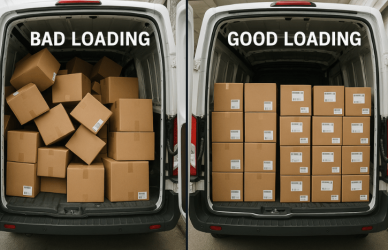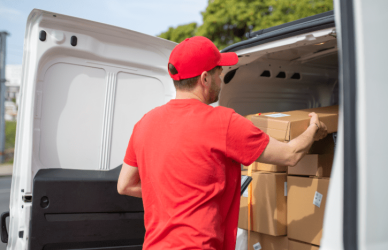As consumers look to cut costs, many are opting for slower, more affordable shipping instead of expedited options. This shift is creating challenges for major carriers like UPS and FedEx, which have both revised their profit forecasts downward. With the holiday season approaching, this trend is reshaping last-mile delivery, making it more difficult for these companies to balance the demand for cost-effective shipping with operational efficiency.
UPS and FedEx, leaders in the U.S. shipping industry according to the Transport Topics Top 100 list, have seen significant drops in their faster services. UPS reported a 7.1% decline in next-day air services, while FedEx experienced a 5% drop in priority packages. Slower deliveries, such as UPS’s SurePost, have gained popularity as consumers become more price-conscious.
Small business owners are feeling the shift too. Sean Lesczynski, who builds custom bikes in Brooklyn, stopped using expedited shipping two years ago due to rising costs. His customers are happy to wait. “It sounds counterintuitive to say like, someone’s going to spend $5,000 on a bike, but they don’t want to spend an additional $500,” Lesczynski said. “But for a lot of people, that is actually the make-or-break difference in terms of how they rationalize or conceptualize that big purchase.
A survey by Project44, covering over 1,300 North American and U.K. consumers, revealed that many shoppers are purchasing gifts earlier this year to save on shipping costs. Two-thirds of respondents plan to spend less on gifts, and 25% cited shipping expenses as a primary concern. “Consumers are stressed,” noted Gordon Glazer, a senior consultant at logistics firm Shipware. “Families are doing everything they can to reduce costs and are willing to wait longer to receive products to do so.”
This trend has impacted last-mile logistics as well. UPS shares have fallen 14% this year, while FedEx shares have risen 7%, a sharp contrast to the S&P 500’s 22% gain. The demand for slower deliveries is increasing, and even with only 17 shipping days between Black Friday and Christmas Eve, shoppers are seeking more budget-friendly options.
In addition to cost, sustainability is also influencing shipping decisions. Amanda Peleman, who runs an Etsy shop in Detroit, had to raise her shipping fees by up to 20% due to rising USPS rates. “A lot of people, more so now, choose the slower shipping options, even on orders where they need them by a certain date,” she noted, highlighting the balancing act many small businesses face.
The rise of eco-conscious companies like Grove Collaborative has further shifted consumer expectations. “Shipping time is a secondary priority compared to sustainability for Grove customers,” said Terrance Underwood, Vice President of Fulfillment Operations.
FedEx and UPS, companies built on fast delivery, are adjusting to these new realities. FedEx’s founder, Fred Smith, revolutionized package delivery in 1971 with the concept of overnight shipping. Since then, both companies have competed heavily in air cargo. However, the demand for fast shipping has declined, a trend accelerated by the COVID-19 pandemic and now referred to as the “COVID hangover,” according to Glazer.
Even Amazon, which set the standard for rapid deliveries, is now encouraging customers to opt for slower shipping by offering incentives for avoiding two-day or next-day delivery. Additionally, Chinese e-commerce giants like Shein and Temu are thriving in the U.S. market by offering affordable goods with longer shipping times, further driving demand for economical options like UPS’s SurePost.
As consumer preferences continue to shift toward cost-saving and sustainable practices, last-mile delivery networks will need to adapt, balancing slower shipping with the logistical challenges of peak seasons and changing market demands.
Source: Transport Topics








